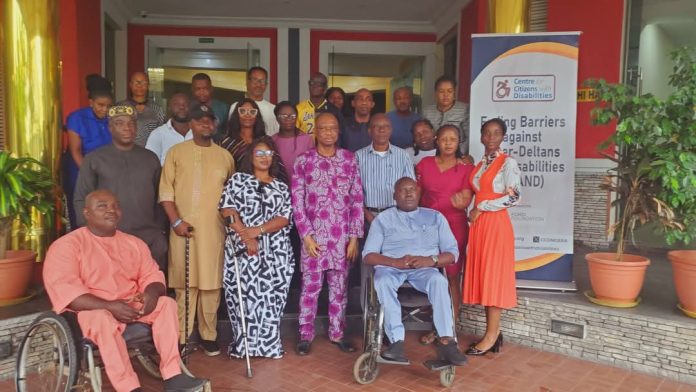In a major step towards disability inclusion in Nigeria’s oil and gas sector, the Centre for Citizens with Disabilities (CCD) officially launched the implementation of the Inclusion of Persons with Disabilities (PWDs) in the Petroleum Industry Act (PIA) Benefit-Sharing Structures and Processes in the Niger Delta Project (EBAND) on February 25, 2025. The launch, which took place through an intensive stakeholder consultative forum, brought together disability leaders, PIA regulators, development experts, and key industry stakeholders to discuss strategies for integrating PWDs into the PIA framework and bridging existing inclusion gaps.
The Petroleum Industry Act (PIA) is a landmark legislation designed to regulate Nigeria’s oil and gas sector, particularly the management of host community benefits. However, despite its promises, concerns have been raised about the exclusion of PWDs from benefit-sharing structures, limiting their access to opportunities and resources. Recognizing this gap, CCD initiated the EBAND project to advocate for and facilitate the inclusion of PWDs in the implementation of the PIA across the Niger Delta states.
A Call for Inclusion and Commitment
Opening the forum, CCD’s Acting Director, Mr. Godwin Unumeri, warmly welcomed the distinguished participants and set the tone for the discussions. He emphasized the critical need for PWDs to be actively involved in the governance and benefit-sharing mechanisms of the PIA. “This project is not just about policy discussions; it is about ensuring that persons with disabilities have a rightful seat at the table where key decisions on oil and gas revenues and community development are made,” he stated.
Delivering a goodwill message, Mr. David Anyaele, a leading disability rights advocate, reaffirmed his unwavering commitment to breaking down systemic barriers that continue to sideline PWDs in the Niger Delta. Highlighting the region’s unique environmental and socio-economic challenges, he stressed that leaving out PWDs in the distribution of petroleum industry benefits would amount to social injustice. “The Niger Delta is home to many persons with disabilities, many of whom have suffered the effects of environmental degradation caused by oil exploration. It is only fair that they are meaningfully included in the PIA benefit structures,” he asserted.
A Data-Driven Approach to Disability Inclusion
The forum featured a thought-provoking presentation by Dr. Joseph Ekong, a renowned development and political expert, who provided an in-depth analysis of the Niger Delta Development Commission (NDDC) and its impact on PWDs. Using statistical records and an inclusion matrix, he mapped out the current state of disability inclusion in PIA structures across the nine Niger Delta states. His presentation revealed significant disparities in how PWDs are considered in benefit-sharing, highlighting the urgent need for policy reforms and proactive implementation strategies.
This data-driven approach sparked critical discussions, as disability leaders from different states shared their lived experiences. Many recounted struggles with accessing employment, community development funds, and opportunities within the petroleum industry due to systemic discrimination and inadequate representation. Their testimonies reinforced the timeliness and necessity of the EBAND project, further galvanizing participants to push for tangible reforms.
Regulatory Commitment to Disability Inclusion
Adding to the momentum, Mrs. Ololade Auwal, Managing Director of the Host Community Development Trust Fund, represented the Chief Executive Officer of the Nigerian Upstream Petroleum Regulatory Commission (NUPRC). In her address, she outlined the Commission’s ongoing efforts to mainstream disability inclusion within the PIA framework. She assured participants that the NUPRC remains committed to fostering an inclusive oil and gas sector where no community member, including PWDs, is left behind.
“Our mandate is to ensure that host communities benefit fairly from the petroleum industry, and this includes persons with disabilities. We recognize the gaps that exist, and through collaboration with stakeholders like CCD, we are committed to making the necessary adjustments to achieve inclusive benefit-sharing,” she affirmed.
Setting the Stage for Inclusive Reforms
By the end of the forum, participants from across the PIA implementation value chain expressed their commitment to supporting the inclusion of PWDs in the benefit structures and processes. Resolutions were made to strengthen advocacy, enhance policy dialogues, and ensure active participation of PWDs in decision-making processes at all levels.
The successful launch of the EBAND project marks a pivotal moment in the fight for disability inclusion in Nigeria’s oil and gas sector. As the project unfolds, it is expected to drive systemic changes that will empower PWDs, ensuring they are recognized and prioritized in the economic benefits derived from the country’s vast petroleum resources.
Acknowledgment
CCD extends heartfelt appreciation to the Ford Foundation for their invaluable support in making this initiative a reality. Their commitment to social justice and inclusion continues to create lasting impacts in the lives of PWDs across Nigeria.
With the EBAND project now in motion, the spotlight is on policymakers, industry regulators, and host communities to translate commitments into action. The journey toward full inclusion has begun, and with sustained advocacy and collaboration, the vision of a truly inclusive Petroleum Industry Act can become a reality.


